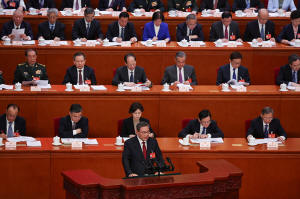China vows to 'transform' economy, sets ambitious growth target
 Send a link to a friend
Send a link to a friend
 [March 05, 2024] By
Antoni Slodkowski, Andrew Hayley and Eduardo Baptista [March 05, 2024] By
Antoni Slodkowski, Andrew Hayley and Eduardo Baptista
BEIJING (Reuters) -Chinese Premier Li Qiang announced an ambitious 2024
economic growth target of around 5% on Tuesday, promising steps to
transform the country's development model and defuse risks fuelled by
bankrupt property developers and indebted cities.
Delivering his maiden work report at the annual meeting of the National
People's Congress, China's rubber-stamp parliament, Li also flagged
higher defense spending, while hardening the rhetoric on Taiwan.
In setting a growth target similar to last year, which will be harder to
reach as a post-COVID recovery is losing steam, Beijing signals it is
prioritizing growth over any reforms even as Li pledged bold new
policies, analysts said.
"Itís more difficult to achieve 5% this year than last year because the
base number has become higher, indicating that the top leaders are
committed to supporting economic growth," said Tao Chuan, chief macro
analyst at Soochow Securities.
Last year's uneven growth laid bare China's deep structural imbalances,
from weak household consumption to increasingly lower returns on
investment, prompting calls for a new growth model.
China started the year with a stock market rout and deflation at levels
unseen since the global financial crisis of 2008-09. The property crisis
and local government debt woes persisted, increasing pressure on China's
leaders to come up with new economic policies.
With awe at China's economic miracle fading rapidly, some economists
have drawn comparisons with Japan's lost decades since the 1990s,
calling for pro-market reforms and measures to boost consumer incomes.

"We should not lose sight of worst-case scenarios," Li said in the Great
Hall of the People in Tiananmen Square.
"We must push ahead with transforming the growth model, making
structural adjustments, improving quality, and enhancing performance."
There was no timeline or concrete details for the structural changes
China intended to implement, however, with Li also emphasizing stability
as "the basis for everything we do".
Li acknowledged reaching the target "will not be easy," adding a
"proactive" fiscal stance and "prudent" monetary policy was needed. The
target considers "the need to boost employment and incomes and prevent
and defuse risks," Li said.
The International Monetary Fund projects China's 2024 growth at 4.6%,
declining towards 3.5% in 2028.
Chinese stocks and the yuan were largely unchanged.
"Policymakers seem happy with the current trajectory," said Ben Bennett,
Asia-Pacific investment strategist at Legal And General Investment
Management.
"Thatís disappointing for those that hoped for a bigger push... Thereís
rhetorical support for local government debt and the property sector,
but the key is how this is applied in practice."
MODERATE STIMULUS
China plans to run a budget deficit of 3% of economic output, down from
a revised 3.8% last year. Crucially, it plans to issue 1 trillion yuan
($139 billion) in special ultra-long term treasury bonds, which are not
included in the budget.
[to top of second column] |

Chinese Premier Li Qiang delivers the work report at the opening
session of the National People's Congress (NPC) at the Great Hall of
the People in Beijing, China March 5, 2024. REUTERS/Florence Lo

The special bond issuance quota for local governments was set at 3.9
trillion yuan, versus 3.8 trillion yuan in 2023. China also set the
consumer inflation target at 3% and aims to create over 12 million
urban jobs this year, keeping the jobless rate at around 5.5%.
"China is unlikely to do bazooka-style stimulus," said Tommy Xie,
head of Greater China research at OCBC Bank. "There are still a lot
of constraints at the moment in terms of how China can support the
economy via fiscal expenditure."
Budgetary plans included an increase in defense spending by 7.2%
this year, similar to 2023 - a figure closely watched by the U.S.
and China's neighbors, who are wary about its strategic intentions
as tensions rise over Taiwan.
China's defense budget has doubled since President Xi Jinping came
to power more than a decade ago. This year marks the 30th in a row
of increasing defense expenditure, based on research by the
International Institute for Strategic Studies.
Li's report also dropped previous mentions of "peaceful
reunification" with Taiwan.
"China is showing that in the coming decade it wants to grow its
military to the point where it is prepared to win a war if it has no
choice but to fight one," said Li Mingjiang, a defense scholar at
the Rajaratnam School of International Studies.
'NEW PRODUCTIVE FORCES'
Faced with a demographic crisis that also threatens the switch to a
consumer-led growth model, China's state planner vowed to improve
policies supporting childbirth, while raising benefits and basic
pensions for its growing elderly population.
On the property sector, Li vowed to finance "justified" projects,
and provide more social housing as Beijing looks to resolve a glut
of unfinished properties that have worried homebuyers.
While Li said China wanted to curb industrial overcapacity, he also
flagged more resources for tech innovation and advanced
manufacturing, in line with Xi's push for "new productive forces,"
Li said.
China will also lift all foreign investment restrictions in the
manufacturing sector and formulate development plans for quantum
computing, big data and artificial intelligence as it strives for
technological self-sufficiency.
Some analysts have criticized China's policy focus on manufacturing,
saying it exacerbates industrial overcapacity, deepens deflation and
heightens trade tensions with the West.
"The pursuit of speed has given way to the change in the model of
growth," said Hu Yuexiao, chief economist at Shanghai Securities.
($1 = 7.1987 Chinese yuan renminbi)
(Additional reporting by Yuhan Lin, Xu Jing, Ellen Zhang, Ella Cao,
Ethan Wang, Joe Cash, Judy Hua, Albee Zhang, Qiaoyi Li, Laurie Chen,
Yew Lun Tian, Liz Lee, Kevin Yao, Liangping Gao, Samuel Shen, Summer
Zhen, Xie Yu and the Beijing and Shanghai newsrooms; Writing by
Marius Zaharia; Editing by Lincoln Feast)
[© 2024 Thomson Reuters. All rights
reserved.]
This material may not be published,
broadcast, rewritten or redistributed.
Thompson Reuters is solely responsible for this content.
 |